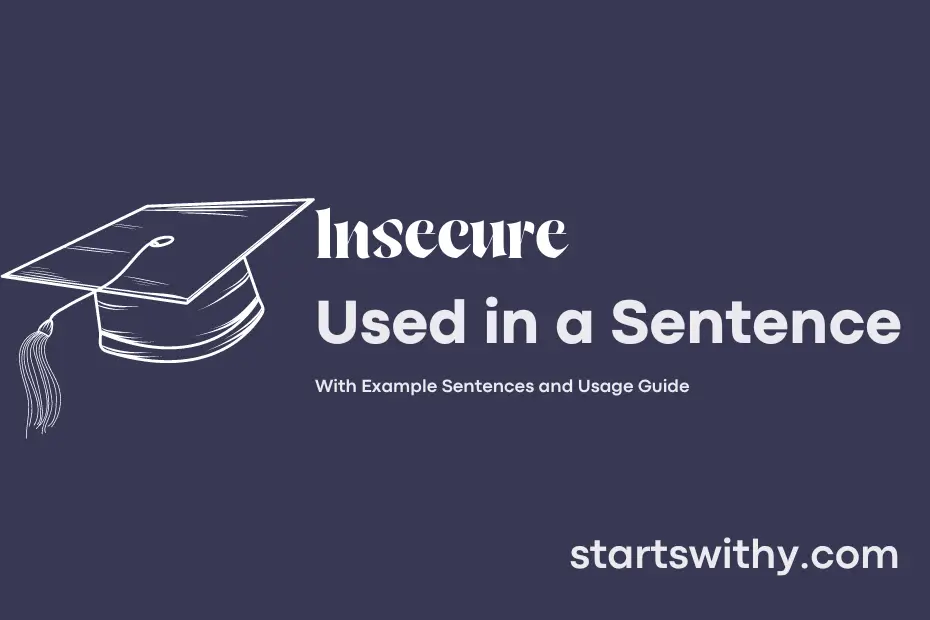Have you ever felt uncertain about your worth or abilities in a particular situation? This feeling of self-doubt and lack of confidence is commonly referred to as being “insecure.”
Insecure individuals often struggle to believe in themselves and may constantly seek reassurance from others. This state of mind can lead to anxiety, fear of failure, and difficulty in forming secure relationships.
7 Examples Of Insecure Used In a Sentence For Kids
- Insecure means feeling worried or not confident.
- It’s okay to feel insecure sometimes, but remember, you are amazing just the way you are.
- When you feel insecure, talk to a trusted adult about your feelings.
- You can help someone who is feeling insecure by being a good friend and encouraging them.
- Everyone feels insecure at times, and that’s okay.
- It’s important to remember that being insecure doesn’t mean you are not special.
- You can overcome feeling insecure by believing in yourself and your abilities.
14 Sentences with Insecure Examples
- Insecure about their academic performance, many college students seek tutoring services.
- Finding their social circle changing, some students feel insecure about making new friends in college.
- The pressure to excel in competitive exams can make students feel insecure about their future.
- Insecure about their communication skills, some students hesitate to participate in class discussions.
- Being away from home for the first time can trigger feelings of insecurity among college students.
- The fear of not getting a job after graduation can make students feel insecure about their career prospects.
- Insecure about their financial situation, some students struggle to afford basic necessities.
- Comparing themselves to their peers can make students feel insecure about their abilities.
- Struggling to balance academics and extracurricular activities, students may feel insecure about their time management skills.
- Insecure about their appearance, some students feel pressured to conform to societal standards of beauty.
- Facing academic challenges, students may feel insecure about their intelligence and capabilities.
- Insecure about their language proficiency, international students may feel anxious about communicating effectively.
- The fear of failure in a highly competitive environment can make students insecure about their worth.
- Seeking approval from others, some students may feel insecure about expressing their true selves.
How To Use Insecure in Sentences?
To use Insecure in a sentence, first, identify a situation where someone feels doubtful or lacks confidence. For example, “She felt insecure about her ability to speak in public.”
Next, place Insecure in the sentence in a position that makes sense and emphasizes the lack of confidence or uncertainty. Make sure Insecure is correctly placed within the sentence structure.
Remember that Insecure should be used to describe feelings of self-doubt, lack of confidence, or uncertainty about oneself or a situation. Here are some examples:
- “His constant need for validation made him feel even more insecure.”
- “The criticism she received from her peers made her feel insecure about her appearance.”
- “Feeling insecure, she hesitated to share her ideas during the meeting.”
By using Insecure in context, you can convey the specific emotions and thoughts associated with the word effectively. Consider the feelings that it conveys and use it appropriately to add depth to your sentences.
Practice using Insecure in different sentences to get a better understanding of its usage. With time and practice, you will become more familiar with incorporating Insecure into your everyday vocabulary.
Conclusion
Insecure sentences often stem from a lack of confidence in oneself or one’s abilities, leading to uncertainty or doubt in communication. They may reveal hesitation, self-doubt, or a sense of vulnerability. Such sentences can impact how others perceive the speaker or writer, potentially undermining their credibility or persuasiveness. Overcoming insecurity in language can involve building self-assurance, honing communication skills, and seeking validation from trusted sources.
By recognizing and addressing insecure language patterns, individuals can improve their assertiveness, clarity, and effectiveness in conveying their ideas. Developing a strong sense of self-worth and confidence can help in crafting more confident and impactful sentences, leading to clearer and more convincing communication. Overall, working towards confident expression can enhance personal and professional relationships and contribute to greater success in various aspects of life.



